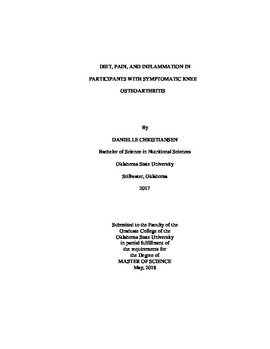| dc.description.abstract | Osteoarthritis (OA) is a degenerative joint disease that affects the cartilage, subchondral bone, and synovial fluid. Risk factors for knee OA include increase adiposity, where excess adipose tissue release pro-inflammatory cytokines and adipokines, creating a state of chronic inflammation, and leading to the activation of matrix metalloproteinases, which facilitate cartilage breakdown. Individuals with knee OA experience pain upon walking or standing, decreased range of motion, and loss of function in the affected joint. The purpose of this study is to: (1) evaluate the relationship of dietary nutrient intakes with quality of life indicators, pain scores, and serum biomarkers of inflammation and cartilage degradation in participants with symptomatic knee OA (observational) and (2) evaluate the effects of freeze-dried strawberries on serum biomarkers of cartilage degradation in participants with symptomatic knee OA (intervention). Study participants (n=17) with abdominal obesity and symptomatic knee OA completed baseline self-reported dietary records, VAS and ICOAP pain score evaluations, HAQ-DI quality of life indicator assessments, and serum blood draws to assess biomarkers of inflammation and cartilage degradation. Subjects were then randomly assigned to consume 50g of freeze-dried strawberry powder each day or 50g of placebo powder in this 26-week, randomized, double-blind, placebo controlled, cross-over intervention trial. Results of the observational data showed significant inverse correlations of soluble fiber with serum MMP-3, total sugar with MMP-8, saturated fat with MMP-3, vitamin C with MMP-8, and copper with IL-6. Results from our 26-week cross-over intervention showed freeze-dried strawberry supplementation significantly reduced serum concentrations of MMP-3 compared to the placebo. Our study identifies intriguing relationships between dietary nutrient intakes and biomarkers of inflammation and cartilage degradation by suggesting that a well-balanced diet, with adequate intakes of saturated fat, sugar, vitamin C, soluble fiber, and copper, may have a protective role against the activation of cartilage degrading enzymes in knee OA. Additionally, strawberry supplementation decreased serum MMP-3 concentrations suggesting that well-balanced eating habits should also incorporate an array of antioxidant rich foods, including the bioactive strawberry, as an adjunct therapy in knee OA. | |
